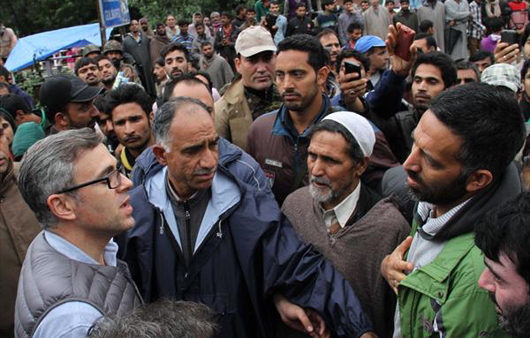Srinagar, Sep 10: Chief minister Omar Abdullah on Wednesday termed the situation in flood-hit Jammu and Kashmir "serious" but hit out at critics who said his government was not doing enough.
"What can I do. I didn't bring the rain, nor can I stop it. If I could, I would have done that," an angry Omar said.
"If the opposition can do anything better about the situation then I am ready to listen to them. This is not the time for politics. I wish they understand this," he added.
Meanwhile, an NDRF jawan was attacked by angry locals in Srinagar while few other personnel of the force were heckled while they were rendering relief and rescue operations in the flood-hit areas.
Officials said a National Disaster Response Force trooper received severe injuries on his hand when the locals attacked him.
The locals apparently wanted the NDRF men to concentrate on a particular area and when the force personnel decided to go to a different marooned area, the locals attacked them.
"A few incidents of our men being heckled are being witnessed since yesterday in the state," a senior officer said.
Worried by the development, the NDRF and senior home ministry officials have asked the cabinet secretary to devise some mechanism so that troops are kept safe while they render their duty.
Water levels started receding in Srinagar and some other parts of the state, but tens of thousands are still stranded on rooftops without food or clean water .
In Srinagar town there is a decrease in water level by 3 to 4 feet since the beginning of the floods, where as there is a rise of 6 inches in Wuller Lake.
Manasbal Lake saw a reduction by 3 inches bringing the water level to 18.3 feet, which is still 4.3 feet above danger mark.
Areas downstream of Jhelum River are experiencing increase in water levels.
Over 76,500 people have been rescued in Jammu and Kashmir. At least 215 people have died in the inundation.
Defence ministry statement said the army has deployed 329 columns of its personnel for rescue and relief operations, of which 244 columns were deployed in the Srinagar region and 85 in the Jammu region.
Foreign tourists were among those rescued. An army spokesperson said additional columns and helicopters have been pressed into use and people were being moved relief camps established by the army as well as civil administration.
"Unless the flood waters recede completely, and we are able to reach all the submerged areas, we cannot be sure about the exact toll in these floods," a top state official said in Srinagar.
The stranded people are guiding rescue teams to the worst-affected areas. The army has airlifted some tourists including foreign tourists.
The army in coordination with the Air Force handed over 10 tons of supplies to the civil administration for distribution. 15 tons of pre-cooked food and 15000 litres of water were also distributed among the affected people, an army spokes person said.
In South Kashmir and Srinagar army camps are also flooded and over 1000 army personnel and families are stranded without food and water.
While supplies are being made available to them, army said it is giving priority to civilians.







Comments
Add new comment